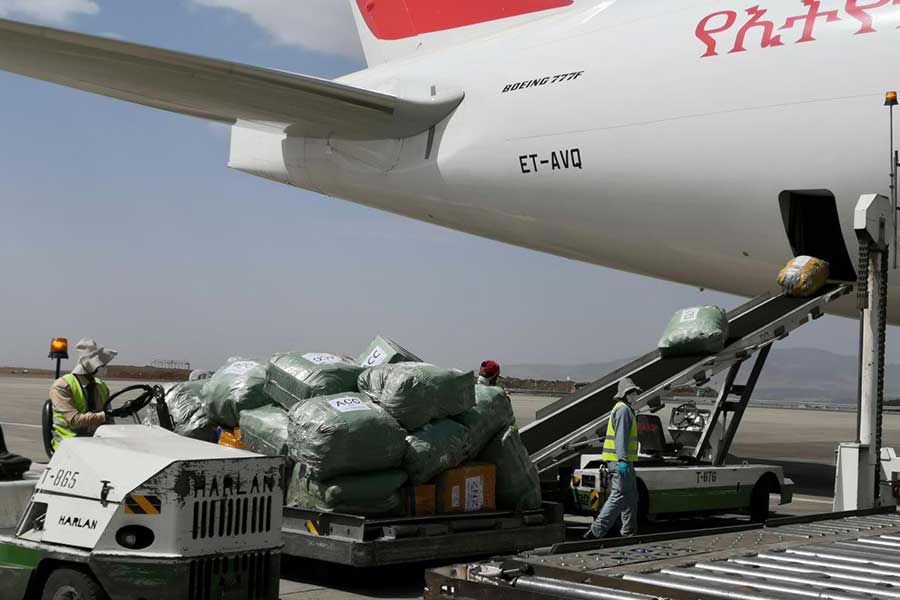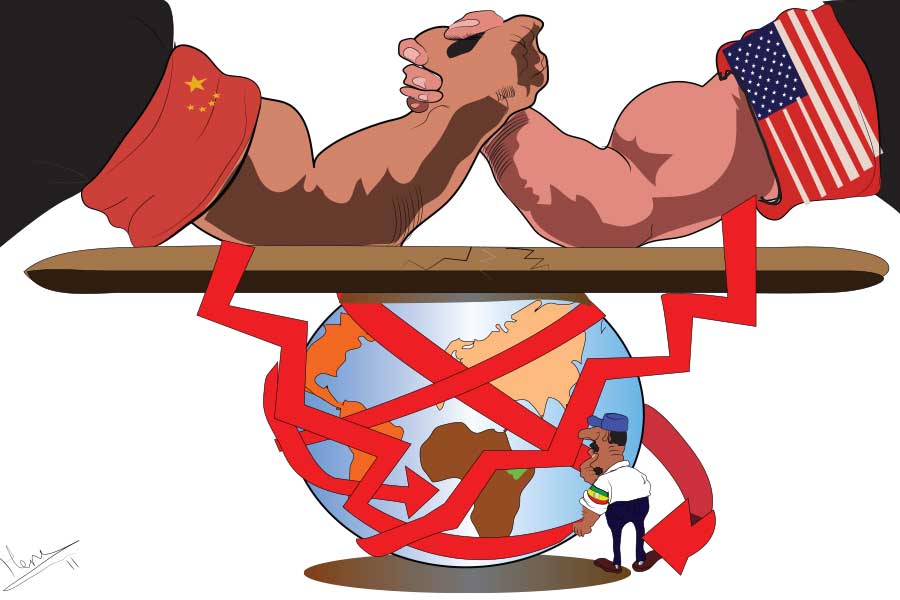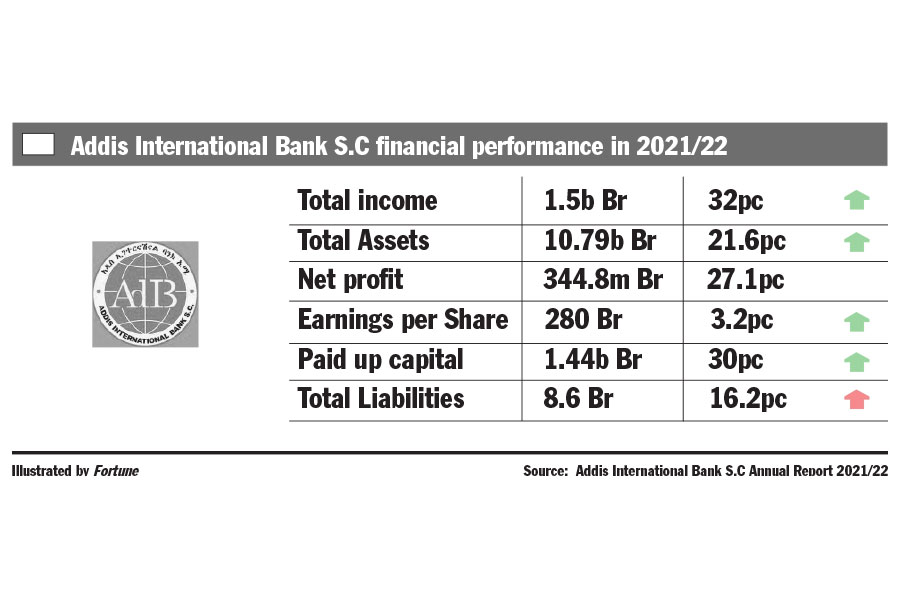
Fortune News | Jan 02,2021
Jan 13 , 2024
By Indermit Gill , M. Ayhan Kose
The global economy is teetering on a precarious balance. While major economies have shown remarkable resilience against steep interest rate hikes, the overall pace of growth remains alarmingly sluggish. Global growth is slowing for the third consecutive year, spanning developed and developing nations. This slowdown signals a potential 'lost decade' of economic stagnation and missed development goals, write Indermit Gill, chief economist and senior vice president for Development Economics at the World Bank, and M. Ayhan Kose, deputy chief economist and director of the Prospects Group at the World Bank. This commentary is provided by Project Syndicate (PS).
As 2024 begins, the outlook for the global economy seems to be improving. Major economies are emerging mostly unscathed from the fastest rise in interest rates in 40 years, without the usual scars of financial crashes or high unemployment. Countries rarely succeed in taming steep inflation rates without triggering a recession. Yet a "soft landing" is now becoming more likely. Not surprisingly, financial markets are in a celebratory mood.
But caution is in order. The World Bank's latest Global Economic Prospects indicates that most economies – developed as well as developing – will grow much more slowly in 2024 and 2025 than they did in the decade before COVID-19. Global growth is expected to decelerate for a third year in a row – to 2.4pc – before ticking up to 2.7pc in 2025. Per capita investment growth in 2023 and 2024 is expected to average just 3.7pc, barely half the average of the previous two decades.
The 2020s are shaping up to be an era of wasted opportunity. The end of 2024 will mark the halfway point of what was supposed to be a transformative decade for development – when extreme poverty was to be eliminated, major communicable diseases eradicated, and greenhouse gas emissions nearly halved. What looms instead is a wretched milestone: the weakest global growth performance of any half-decade since 1990, with average per capita incomes in a quarter of all developing countries set to be lower at the end of 2024 than they were on the eve of the COVID-19 pandemic.
Feeble economic growth threatens to undercut many global imperatives, making it harder for developing economies to generate the investment needed to tackle climate change, improve health and education, and achieve other key priorities. It would leave the poorest economies stuck with paralysing debt burdens. It would prolong the misery of nearly one in three people in developing countries who suffer food insecurity. And it would amount to a historic failure: a lost decade not just for a few countries, but for the world.
It is still possible to turn the tide. Our analysis suggests that most developing economies' performance in the second half of the 2020s can be at least no worse than in the pre-COVID decade if they do two things.
They must focus their policies on generating a broadly beneficial investment boom – one that drives productivity growth, rising incomes, a reduction in poverty, higher revenues, and many other good things. They must also avoid the kinds of fiscal policies that often derail economic progress and contribute to instability.
The evidence from advanced and developing economies since World War II shows that the right mix of policies can increase investment even when the global economy is not strong. Countries around the world have managed to generate nearly 200 windfall-producing investment booms, defined as episodes in which per capita investment growth accelerated to four percent or more and stayed there for more than six years. Both public and private investment jumped during these episodes.
The secret sauce was a comprehensive policy package that consolidated government finances, expanded trade and financial flows, strengthened fiscal and financial institutions, and improved the investment climate for private enterprises.
Developing economies would move one-third of the way closer to their full economic potential if each developing economy that engineered such an investment boom in the 2000s and 2010s repeated the feat in the 2020s. And if all developing economies repeated their best 10-year performance in improving health, education, and labour-force participation, that would close most of the remaining gap. Developing economies' potential growth in the 2020s would be closer to what it was during the 2010s.
An additional option is also available to the two-thirds of developing economies that rely on commodity exports. They can do better simply by applying the Hippocratic principle to fiscal policy: First, do no harm. These economies are already prone to debilitating boom-and-bust cycles (because commodity prices can rise or fall suddenly), and their fiscal policies usually make matters worse.
When commodity price increases boost growth by one percentage point, for example, governments increase spending in ways that boost growth by an additional 0.2 percentage points. In good times, fiscal policy tends to overheat the economy. In bad times, it deepens the slump. This "pro-cyclicality" is 30pc stronger in commodity-exporting developing economies than in other developing economies.
Fiscal policies also tend to be 40pc more volatile in these economies than in other developing economies.
The result is a chronic drag on their growth prospects. This drag can be reduced by – among other things – establishing fiscal frameworks to discipline government spending, adopting flexible exchange-rate systems, and avoiding restrictions on international capital movements. If these policy measures were instituted as a package, commodity-exporting developing economies would increase per capita GDP growth by one percentage point every four or five years.
So far, the 2020s have been a period of broken promises.
Governments have fallen short of the "unprecedented" goals they promised to meet by 2030: "to end poverty and hunger everywhere; to combat inequalities within and among countries; . . . and to ensure the lasting protection of the planet and its natural resources." But 2030 is still over a half-decade away. That is long enough for emerging markets and developing economies to regain lost ground. Governments acting immediately to implement the necessary policies would create causes for everyone to celebrate.
PUBLISHED ON
Jan 13,2024 [ VOL
24 , NO
1237]

Fortune News | Jan 02,2021

Fortune News | Jan 07,2022

Commentaries | Jun 07,2025

Viewpoints | Jun 17,2023

Agenda | Mar 07,2020

Editorial | Aug 24,2019

News Analysis | Apr 22,2023

Commentaries | Sep 06,2020

Viewpoints | Jul 13,2025

Radar | Oct 15,2022

Photo Gallery | 180717 Views | May 06,2019

Photo Gallery | 170911 Views | Apr 26,2019

Photo Gallery | 162003 Views | Oct 06,2021

My Opinion | 137309 Views | Aug 14,2021

Dec 22 , 2024 . By TIZITA SHEWAFERAW
Charged with transforming colossal state-owned enterprises into modern and competitiv...

Aug 18 , 2024 . By AKSAH ITALO
Although predictable Yonas Zerihun's job in the ride-hailing service is not immune to...

Jul 28 , 2024 . By TIZITA SHEWAFERAW
Unhabitual, perhaps too many, Samuel Gebreyohannes, 38, used to occasionally enjoy a couple of beers at breakfast. However, he recently swit...

Jul 13 , 2024 . By AKSAH ITALO
Investors who rely on tractors, trucks, and field vehicles for commuting, transporting commodities, and f...

Nov 1 , 2025
The National Bank of Ethiopia (NBE) issued a statement two weeks ago that appeared to...

Oct 25 , 2025
The regulatory machinery is on overdrive. In only two years, no fewer than 35 new pro...

Oct 18 , 2025
The political establishment, notably the ruling party and its top brass, has become p...

Oct 11 , 2025
Ladislas Farago, a roving Associated Press (AP) correspondent, arrived in Ethiopia in...

Nov 2 , 2025
The National Bank of Ethiopia (NBE) has scrapped the credit-growth ceiling that had s...

Nov 2 , 2025 . By SURAFEL MULUGETA
The burgeoning data mining industry is struggling with mounting concerns following th...

Nov 2 , 2025 . By YITBAREK GETACHEW
Berhan Bank has chosen a different route in its pursuit of a new headquarters, opting for a transitional building instea...

Nov 2 , 2025 . By BEZAWIT HULUAGER
Nib International Bank S.C. has found itself at the epicentre of a severe governance...